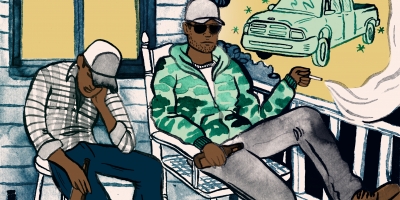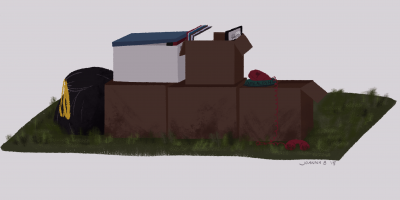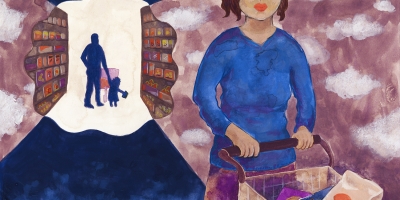Fiction
Flowers Next Winter
by Camden Avery

When after fifty-nine years of marriage Anne died she did it suddenly, no warning, puff puff and her lungs gave out. There was no illness, no sign of something wrong, she was there and then she wasn’t. She fell over in the kitchen with a bag of apples and the cat found her. She was seventy-eight years old, she was beloved. Her slippers were a little old.
The house was lucid, irreproachable. Bought cheap and paid for, wallpapers updated just long enough ago, runner beans in the side yard. In the instant of her death Anne’s best china assumed an attitude of despair.
How short! she thought. How quick! And it was.
The cat, whose name was Geraldine, died seven days later and the way it happened was this.
William had never done the shopping. He forgot the cat food twice. He fed milk and crackers to the cat with peanut butter. The cat wouldn’t eat it, became exasperated, ran finally out of the house. The next morning William saw it flattened on the road beside the mailbox. The poor thing had had a go at catching moles. He buried it behind the wood stack.
The rain that winter was final—supple and pathetic.
The children helped William make arrangements. They visited the lawyer, wore black, threw out expired food in the freezer, saw to the funeral which was boring and short. They flew home.
Fifty-nine years! Fifty-nine anniversaries, fifty-eight Christmases, what comes after a life like that? William sought solace in the record collection that night but nothing happened, his heart froze.
The awful thing was not that it was over but how small it all felt now, yet it was everything: small and large, large and small, a buoy flashing on the waves. Everything and nothing. Where did it go?
William’s grief was made known in fits. Imperceptible at first, a nervous tic. The grass in the yard grew long, his pants grew thin. He began to count: bluebirds, telephone poles, steps to the grocery store. It made things manageable, one and two and so on. He bought coffees he didn’t drink.
After all this, things were changed, life was different, his head was in a jumble. Not the sad kind you sometimes see with wanderings and wrong clothes, something quieter. Blacker.
It began one night with the sound of the wind in the eaves. He had always loved the sound of the wind in the eaves but it turned out it was never the sound of the eaves he liked in the dark but the shape Anne took up in the darkness beside him, the difference, the inside and the outside and tonight he thought this is it, here it is, here it comes, it really is over and it was. It was all over, something had departed.
Things were somehow clearer then.
As proof he began to recall Anne’s favorite flowers in the order in which they lay about the garden starting with H for hazel with the frosty starry yellow flowers but he couldn’t even get that far, he only got as far as the rambling ferns which were his favorite and which Anne detested and stomped them out.
In a further experiment he listed from one to fifty-eight the birthday presents she had bought him but only got as far as number seventeen, the record player. The rest was jumbled, it was salad, time had squashed it up. The failures of his love had multiplied.
That night in a luxurious fit of anger he burned her journals unread in the bathtub, now they were hers forever, of course he had to open the window and even then the curtains were a little scorched. He gave up partway through anyway and turned the shower on the pile of sludgy gray mush.
When April came he forgot the exact date they met and he knew it was all going now, everything, all the wonderful and stupid things that only he would know. Who could possibly help him now? How simply it would all go by, the world they had made.
Ten months passed, stunned, paralyzed. He dusted and labeled the albums of family photographs, he made lists of from where and whom the furniture had come, he devised an inventory of items in the refrigerator, he prepared. He bought canned tuna fish on two-for-one.
When the ground finally broke that spring the perfumey smell of newness was aggressive and peculiar.
Summer was ravaged, full of spiders.
But in fall again the world was sweet as always, brown and autumn, dwindling and honest, like a promise. The fall was theirs always for romance, that he did remember. In the high transparent air something shifted, a lone ray pierced his heart.
It was too much.
It was a bright day and the leaves had almost begun to fall and suddenly Anne’s clothes started sailing down from the second floor window into the gravelly yard: flannel nightdresses, dumpy sweaters, shoes, hats and scarves all followed one another in a sad parade. The neighbors puttered concernedly, they gathered. After lunch William raked the clothes into a mulch bag to leave out for the trash collection and inexplicably something in his chest surged.
He felt steadier on his feet, stronger.
It was then, he knew, he was on to something. Next were the books.
Gardening, histories, novels, poetry, one volume was quite the same as his neighbor. It happened suddenly, accidentally—before he knew what he was doing the room was musty with loose pages like small unhappy birds, the books littered the living room floor, his hair was damp.
He hired a dumpster. He emptied the refrigerator, he washed it, he left it empty so that when he opened it in the flat gray early mornings he would remember instantly, it would bathe the kitchen in a holy light.
Out they went! Her favorite cooking pot, the wedding china, photos in their silver frames. Out, out! What they had touched, what they had shared—the records, the first album they bought together, her makeup drawer, furniture waiting to be repaired, the expensive beautiful soap they fought over, the houseplants which anyway were dead now, a quilt she made, art from the walls, love letters and ancient baby things, her pillow which smelled like her, his grandmother’s Christmas ornaments, colored bottles of household cleaner, the first and last jewelry he had ever given her, the ridiculous stories she wrote, checkbooks, taxes, the rubbed velvet box like a cat’s nose for the engagement ring, flowers uprooted from the garden. Goodbye poetry! Goodbye art! Goodbye music and light!
He tore the telephone from the wall.
When the dumpster had at last been rolled away William was remorseless, he was new, and suddenly like purple light he was flooded with her, her stained teeth, her anger, the shapes of her knuckles, her voice, and he knew it was there, it was his for as long as it lasted.





